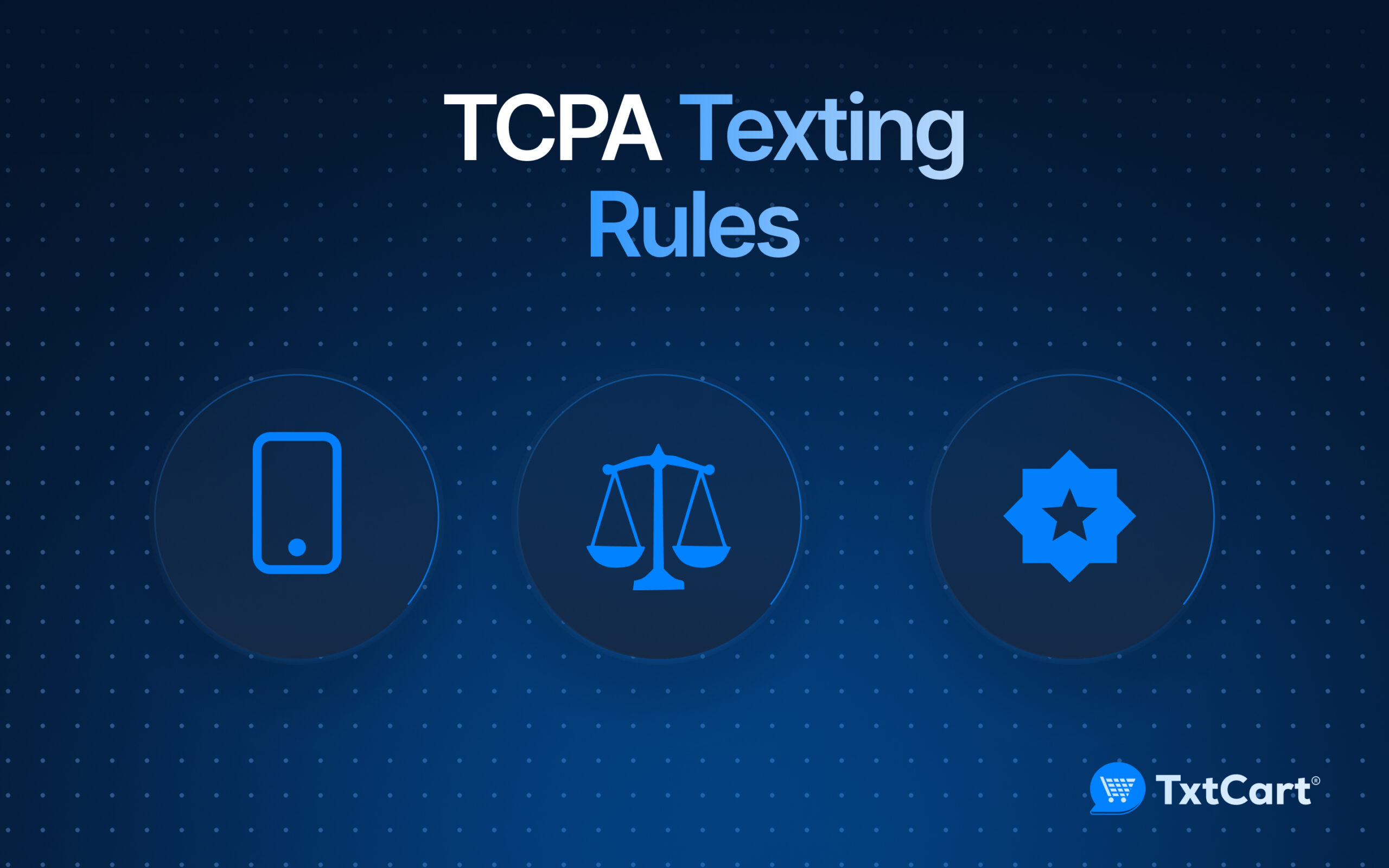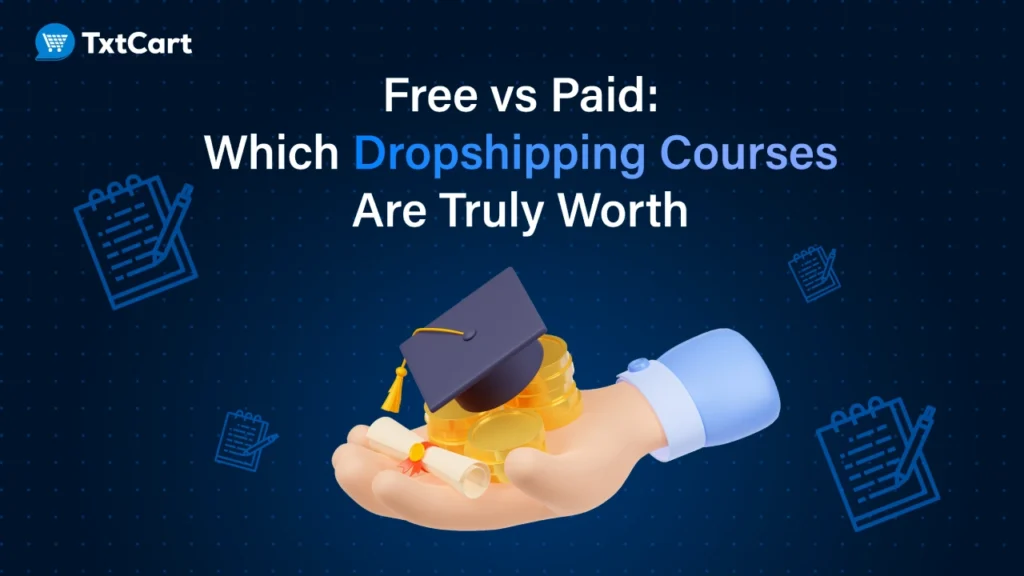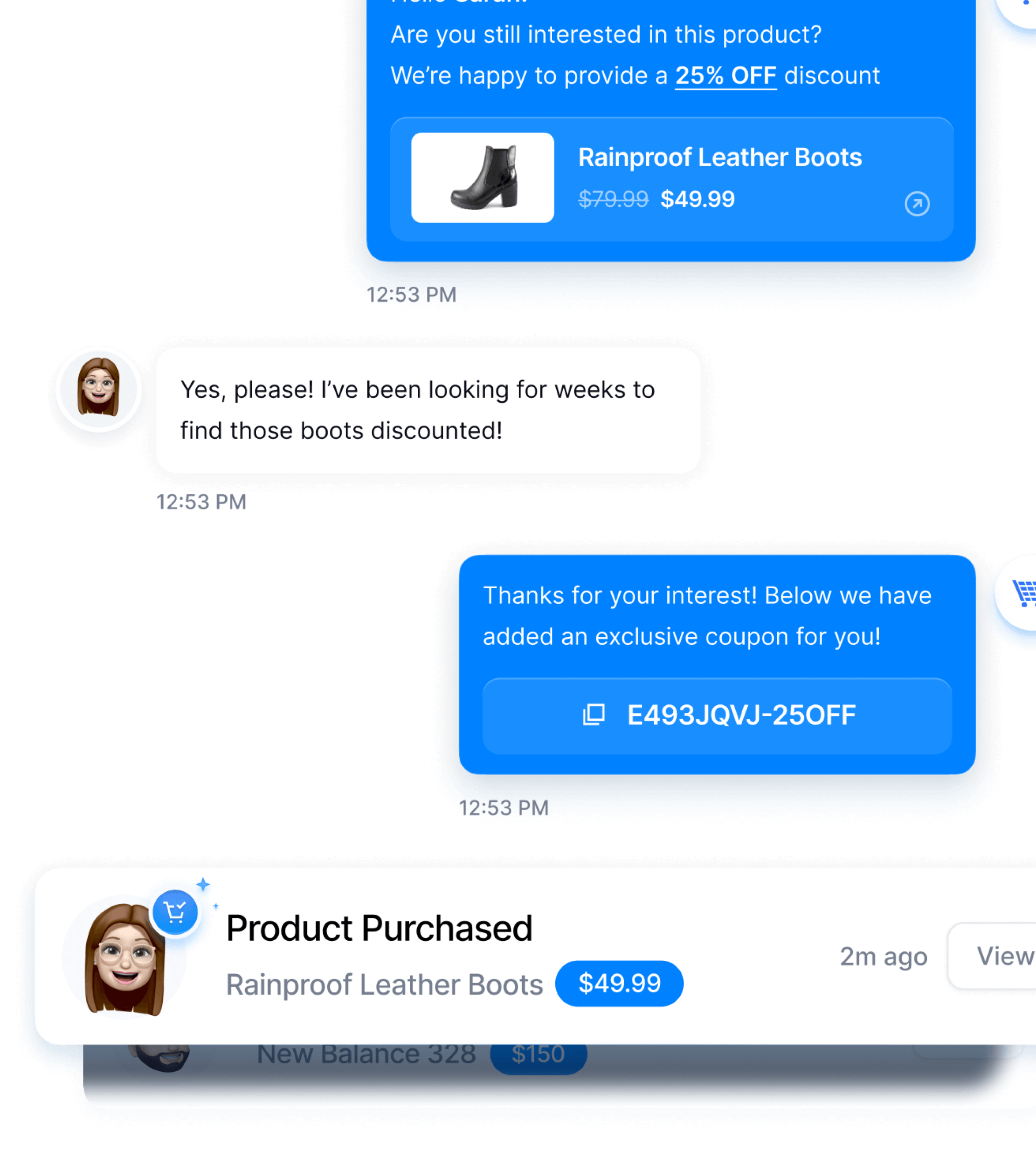Disclaimer: This article provides general guidance on mobile compliance only and is not legal advice. Brands must work directly with their own legal teams to ensure their programs comply with state and federal requirements.
Is Your SMS Marketing TCPA-Compliant?
SMS marketing offers powerful reach and engagement for eCommerce brands, but compliance with the Telephone Consumer Protection Act (TCPA) is essential to avoid costly fines and maintain customer trust. The TCPA protects consumers from unwanted messages, and following its guidelines is key to a legally sound and effective SMS strategy.
Ignoring compliance isn’t just risky—it’s expensive. Here’s what’s at stake:
- Financial Penalties: Fines range from $500 to $1,500 per message sent without proper consent, which can escalate quickly in large campaigns.
- Brand Trust: Respecting consumer privacy with TCPA compliance builds trust and fosters customer loyalty, making compliance a brand asset.
This guide will simplify TCPA compliance, ensuring you can focus on growth without legal worries. Here’s what to expect:
- Essential Steps for Compliance: Clear guidance on obtaining consent, managing opt-outs, and securing customer trust.
- Detailed Compliance Checklist: Follow each step to ensure your SMS campaigns are fully compliant.
- Real-World Examples: Insights from brands that faced penalties to highlight the true cost of non-compliance and actionable takeaways.
P.S. TxtCart’s SMS solution is designed with compliance in mind, offering a free 14-day trial to help you explore automated consent management and privacy-focused SMS strategies. Get started today and ensure every message is both effective and compliant.
Ready to make sure your SMS marketing is compliant? Let’s dive in.
Why TCPA Compliance is Essential for Shopify and eCommerce Brands
TCPA compliance isn’t just a checkbox—it’s a cornerstone of responsible SMS marketing for eCommerce brands. Ensuring compliance with the Telephone Consumer Protection Act (TCPA) helps protect businesses from financial risk, builds customer trust, and strengthens brand reputation. Here’s why it matters.
1. Legal Risks of Non-Compliance
Ignoring TCPA guidelines can lead to significant legal consequences, including:
- Hefty Financial Penalties: Businesses can face fines of $500 to $1,500 per unsolicited text message. This might not seem like much at first glance, but with high-volume SMS campaigns, even a few violations can add up to tens or hundreds of thousands of dollars.
- Class Action Lawsuits: TCPA violations are a common cause for class-action lawsuits, where affected customers can band together. These lawsuits have led to multi-million dollar settlements for well-known brands, tarnishing reputations and taking a severe financial toll.
TCPA compliance is the simplest, most effective way to protect your business from these potential pitfalls.
2. Building Customer Trust and Enhancing Conversions
In today’s privacy-conscious world, trust is currency. When customers know your brand respects their boundaries and privacy, they’re more likely to engage positively with your messages. Here’s how TCPA compliance fosters customer trust and boosts conversions:
- Clear Consent: Customers appreciate transparency and choice. By obtaining explicit consent for SMS marketing, you demonstrate that you value their permission, which can increase engagement and response rates.
- Privacy Assurance: By complying with TCPA regulations, you reassure customers that their information is secure and used responsibly. This can help create a stronger, trust-based relationship with your brand.
According to studies, customers are more likely to respond to brands they trust, meaning that compliance doesn’t just reduce legal risk—it can improve your marketing performance.
Brands like Joyride, an LA-based dog harness company, demonstrate the benefits of compliant SMS marketing. Using TxtCart, they generated $1,841,617 in SMS-attributed revenue, facilitated 23,616 sales, and engaged in over 2.8 million customer conversations.
Key statistics:
- $1,841,617 in SMS-attributed revenue
- 12.4x return on investment (ROI) from SMS
- 23,616 sales generated
Joyride, an LA-based dog harness brand, leveraged TxtCart’s 2-way SMS to generate $1,841,617 in revenue, with 23,616 sales generated and over 2.8M customer conversations, driving massive growth in their eCommerce operations.
$1,841,617
SMS Attributed Revenue
12.4x
SMS Attributed ROI
23,616
Sales Generated
“Kyle and the team at TxtCart have been instrumental in our growth. They’ve worked closely with us to create custom solutions and the results have been phenomenal. TxtCart has helped us scale significantly and provided support at every turn.“
Founder, Joyride
3. Protecting and Enhancing Brand Reputation
Compliance isn’t just about following rules; it’s about building a brand that consumers respect and choose. TCPA compliance shows that your business prioritizes ethical marketing practices, reinforcing your brand’s positive image:
- Long-Term Brand Loyalty: Businesses that adhere to TCPA guidelines are viewed as more credible and trustworthy, which strengthens customer loyalty.
- Competitive Advantage: As more consumers become aware of data privacy, TCPA compliance can differentiate your brand from competitors who might overlook it.
- Reduced Negative Publicity: Avoid the negative press that often accompanies TCPA violations and legal battles. Compliance helps keep your brand reputation untarnished and out of unwanted headlines.
TCPA compliance does more than protect against fines. It builds trust, encourages customer engagement, and strengthens your brand’s image. By prioritizing privacy and respecting customer rights, your business not only avoids costly mistakes but also sets the foundation for long-term success in SMS marketing.
If you’re new to SMS marketing or looking to get started, check out our Ultimate Beginner’s Guide to Shopify SMS Marketing to set up the basics effectively before diving into compliance.
Understanding TCPA and Its Role in SMS Marketing
To make the most of SMS marketing, it’s essential to understand the Telephone Consumer Protection Act (TCPA) and its impact on all text message marketing call-based communication. This federal law shapes how businesses can engage with consumers through SMS, ensuring that all marketing practices respect user privacy and consent.
What is TCPA?
The Telephone Consumer Protection Act (TCPA), enacted in 1991, was designed to regulate telemarketing calls, prerecorded voice messages, and—more recently—SMS text messages. For SMS marketers, TCPA establishes clear guidelines on how and when brands can send promotional and marketing text messages to consumers.
Scope of TCPA: The law restricts unsolicited texts, requiring businesses to follow stringent standards when reaching out to potential customers. It specifically applies to marketing messages rather than transactional or informational texts, making it particularly relevant for eCommerce brands that rely on SMS for promotions and offers.
Why TCPA Exists
The TCPA was created to address growing consumer complaints around unwanted, invasive communications. As communication technologies evolved, the law expanded to cover SMS, providing protections for consumers from excessive or unwanted text messaging.
- Consumer Protection: The core purpose of TCPA is to ensure that consumers have control over who can contact them and when. This allows customers to choose which businesses can reach them via text and reduces the risk of harassment or unwelcome messages.
- Privacy as a Priority: In an era where privacy is a growing concern, TCPA represents a significant step towards protecting consumer rights. By enforcing consent-based marketing, it helps consumers feel safer and more respected when interacting with brands.
TCPA compliance is not just about avoiding fines—it’s about respecting consumer boundaries, which can enhance your brand’s image.
Key Compliance Factor: Consent
When it comes to TCPA compliance, consent is everything. Under the TCPA, businesses must obtain express written consent from consumers before sending any voice calls or marketing-related text messages. Here’s what this means for eCommerce brands:
- Express Written Consent Defined: This form of consent must be explicit and documented, typically obtained through checkboxes, online forms, or SMS keyword opt-ins. The consumer must be fully aware that by opting in, they’re agreeing to receive promotional messages.
- No Loopholes: Unlike other forms of marketing, there’s no room for implied consent in TCPA-compliant SMS marketing. Every promotional message must be backed by documented consent, ensuring customers have willingly chosen to receive these communications.
- Why Consent Matters: Consent does more than protect your brand legally—it also builds trust and transparency with your audience. By making consent central to your SMS marketing strategy, you show your customers that you prioritize their privacy and comfort.
Pro Tip: Make your opt-in process clear and user-friendly. Ensure that users fully understand what they’re agreeing to when they provide consent to receive your SMS messages.
TCPA is a critical regulation that protects consumer privacy in SMS marketing by enforcing consent-based communication. For eCommerce brands, staying compliant means more than following rules—it means showing respect for your customers’ preferences and privacy, which can lead to more engaged, loyal customers.
The TCPA Compliance Checklist for SMS Campaigns
Ensuring TCPA compliance is essential for eCommerce brands using SMS marketing. This step-by-step checklist is designed to make compliance straightforward, helping you avoid hefty fines while building trust with your audience. Here’s what Shopify brands need to keep in mind:
1. Obtain Express Written Consent
At the heart of TCPA compliance is express written consent. Before sending any marketing SMS, it’s crucial to obtain clear, documented and explicit permission from each customer.
- What Constitutes Written Consent?
Written consent can be collected in multiple ways, such as:- Checkboxes at Checkout: Include a checkbox during checkout that customers must actively select to opt in.
- SMS Keyword Opt-Ins: Encourage customers to text a keyword (e.g., “JOIN”) to sign up for SMS updates.
- Sample Language for Consent
Use clear language to ensure customers understand what they’re opting into. Here’s a sample consent message:“By checking this box, you agree to receive promotional messages from [Your Brand]. Message frequency may vary. Reply STOP to unsubscribe. Message and data rates may apply.”
Pro Tip: Ensure that customers take an action to consent (like checking a box) and that the consent language is clear and unambiguous.
2. Provide Clear Disclosures
Transparency is key to building trust and staying compliant. When collecting consent, disclose essential information upfront so customers know exactly what to expect.
- Key Details to Include:
- Business Name: Make it clear who the messages will come from.
- Purpose of Messages: State that messages will contain promotions, special offers, or updates.
- Message Frequency: Let customers know how often they can expect to hear from you (e.g., “up to 4 messages per month”).
- Opt-Out Instructions: Provide clear instructions on how to unsubscribe from messages.
Why It Matters: Disclosing these details upfront not only fulfills legal requirements but also helps build customer trust by making your SMS practices transparent.
For an in-depth look at all aspects of SMS compliance beyond TCPA, our Complete Guide to SMS Marketing Compliance covers everything you need to know to keep your SMS strategy secure.
3. Set Easy Opt-Out Instructions
TCPA requires every SMS to include a simple way for customers to opt in message call-out. This step is crucial in maintaining compliance and respecting customer preferences.
- Standard Opt-Out Phrase: Include an opt-out phrase like:“Reply STOP to unsubscribe.”
- Why Opt-Out Instructions Are Essential: Clear opt-out instructions give customers control over their communication preferences and reduce the risk of complaints or non-compliance.
Best Practice: Automate opt-out management so customers are instantly removed from your SMS list upon requesting to unsubscribe.
4. Send Messages Only During Business Hours
Timing matters when it comes to TCPA compliance. To respect customers’ privacy and avoid potential penalties, stick to designated business hours for sending SMS.
- Acceptable Hours: Send SMS messages only between 8 AM and 9 PM local time of the recipient.
- Penalties for Violating Timing: Sending messages outside these hours can result in TCPA violations and fines. Always consider time zones to avoid accidental late-night messages.
Pro Tip: TxtCart helps you automate message timing based on the recipient’s local time, ensuring you stay within compliant hours.
With TxtCart’s Campaign Planning & Performance Optimization features, eCommerce brands can precisely control these elements, ensuring campaigns are both effective and compliant. TxtCart’s quiet-hour scheduling option automatically restricts messaging to TCPA-approved hours, so messages aren’t accidentally sent late at night.
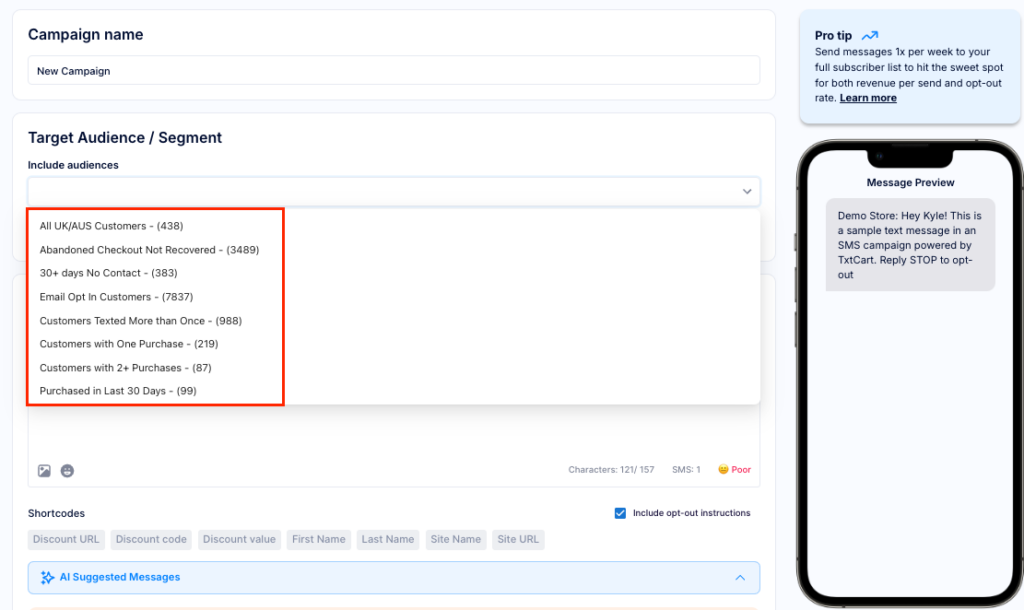
In addition, TxtCart’s segmentation, shortcodes, and AI copy assistant make it easy to create tailored messages based on subscriber behavior. For brands seeking to optimize engagement, TxtCart’s A/B testing allows you to experiment with campaign variations and determine what resonates best with your audience.
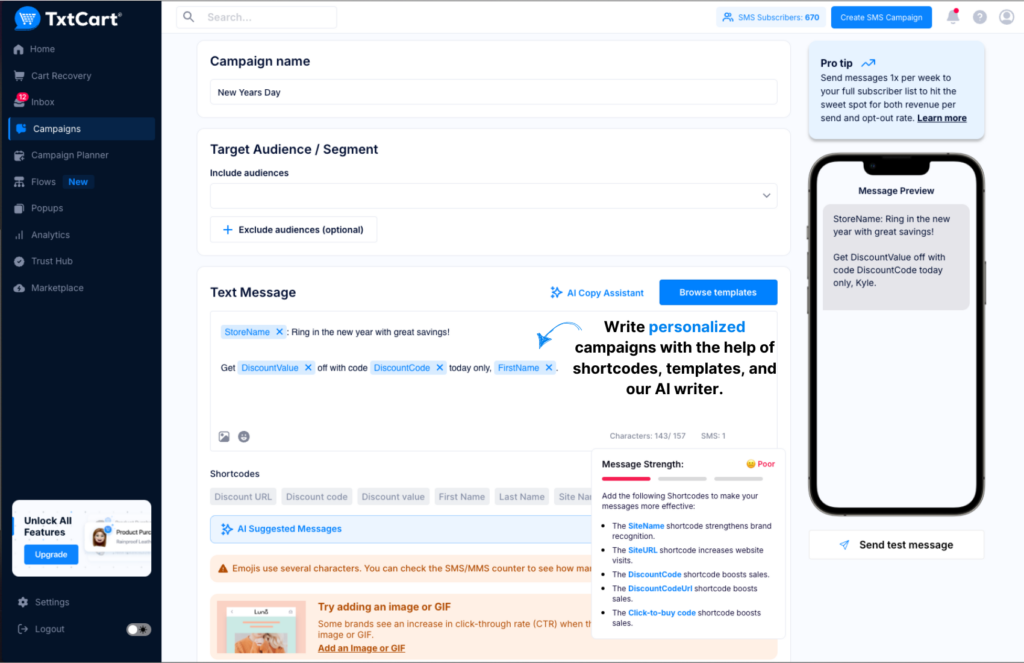
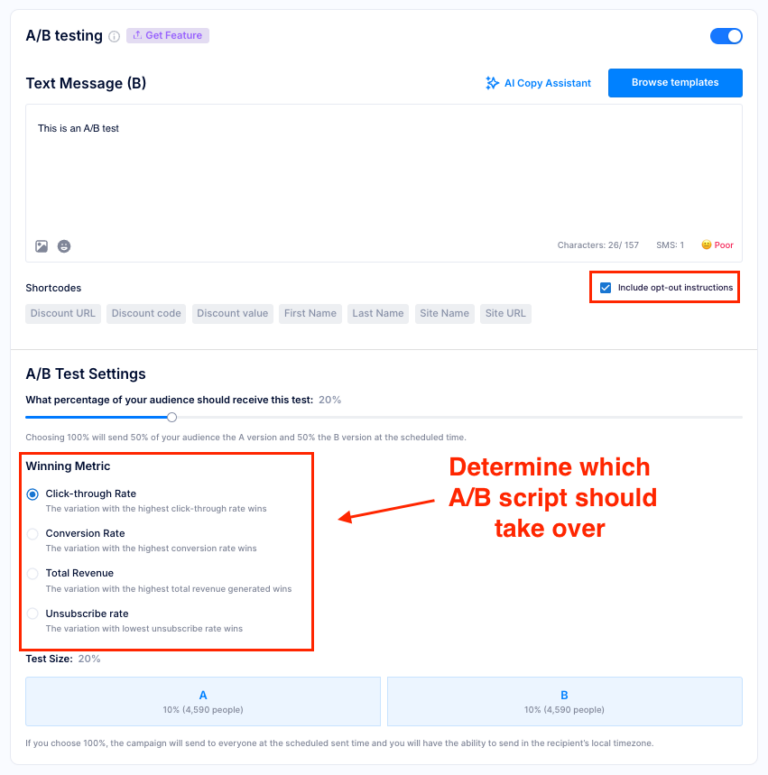
5. Respect the National Do Not Call Registry
The National Do Not Call Registry is a list of individuals who have opted out of receiving telephone solicitation and marketing communications. Ensuring that you do not contact individuals on this list is an essential part of TCPA compliance.
- Why It’s Important: Reaching out to individuals on this registry without explicit consent can lead to significant fines and legal consequences.
- How to Stay Compliant: Regularly check your SMS contact list against the Do Not Call Registry to ensure that no registered numbers are included in your campaigns.
Quick Tip: Most TCPA-compliant SMS platforms, like TxtCart, offer built-in tools to automatically cross-reference contacts against the Do Not Call Registry.
By following this checklist, you’ll not only stay TCPA-compliant but also show your customers that you respect their privacy and communication preferences.
Organi Grow Hair, a vegan haircare brand, leveraged TxtCart’s automated consent tracking and achieved over $1.2 million in SMS revenue while staying fully compliant.
Key statistics include:
- $1,248,723 in revenue attributed to SMS
- 26,241+ orders attributed to SMS
- 16.9x return on investment (ROI) from SMS
Organi Grow Hair, a vegan and organic haircare brand, used TxtCart’s 2-way SMS to recover $25K monthly, drive 42% reply rates, and deliver 9,500+ personalized campaign orders.
$1,248,723
Revenue Attributed to SMS
26,241+
Orders Attributed to SMS
16.9x
SMS Attributed ROI

“TxtCart has really built something special and we’ve been a fan for over 3 years. The organic conversations pair so well with our organic products, providing additional revenue and customer satisfaction.”
Founder, Organi Hair
Remember: TCPA compliance is an ongoing commitment, not a one-time task. By incorporating these practices into your SMS marketing strategy, you’ll protect your business from legal risks and build stronger, trust-based relationships with your customers.
TCPA Exceptions: Types of Messages That Don’t Require Consent
Not all text messages are created equal under the TCPA. While marketing messages require express written consent from recipients, certain non-promotional, transactional messages are exempt from these requirements. Understanding which messages fall under this category allows eCommerce brands to communicate effectively without risking non-compliance.
What Are Transactional Messages?
Transactional messages are non-marketing communications that provide essential information related to a customer’s purchase or account status. These messages do not require prior express consent, because they serve an informational purpose rather than a promotional one.
- Examples of Transactional Messages:
- Order Confirmations: Messages that confirm a purchase, including order details, payment confirmation, and estimated delivery times.
- Shipping Notifications: Updates on the status of an order’s shipment, such as when an item is shipped, out for delivery, or delivered.
- Security Alerts: Messages related to account security, including password reset links, notifications of suspicious login attempts, and other security confirmations.
Quick Note: Although these messages don’t require explicit consent, it’s still best practice to keep them relevant, concise, and non-promotional to avoid confusing recipients or violating the spirit of the TCPA.
Read Next: 10 Best SMS Flows to Boost Your Shopify Store Sales
Implications for Shopify Stores
While transactional messages are essential and exempt from TCPA consent requirements, it’s important to recognize that most SMS messages sent by Shopify and eCommerce stores fall into the promotional category and therefore must adhere to TCPA guidelines. Here’s why:
- Defining Promotional Content: Messages that contain offers, discounts, announcements, or product recommendations are classified as marketing content under the TCPA, even if they are loosely tied to a customer’s previous purchase.
- Hybrid Messages Require Caution: For example, a shipping confirmation that also includes a “10% off your next purchase” offer could be considered promotional. Even small promotional phrases can change a message’s classification, making TCPA compliance mandatory.
- Adherence to TCPA for Most SMS Campaigns: Given that eCommerce SMS marketing is typically promotional, nearly all of these messages will need explicit consent. It’s crucial for Shopify brands to structure their SMS campaigns accordingly, ensuring compliance from the very first interaction with a customer.
Pro Tip: To keep communications clear and compliant, separate your transactional and promotional messages. Use transactional texts solely for informational purposes and create distinct marketing messages that comply with TCPA guidelines.
While transactional messages offer a useful channel for keeping customers informed without requiring consent, promotional content always demands TCPA compliance. By distinguishing between these message types and carefully crafting your SMS content, your Shopify or eCommerce store can communicate more effectively, reduce the risk of legal issues, and foster trust with your customers.
Best Practices for TCPA Compliance in SMS Marketing
Ensuring TCPA compliance is an ongoing commitment that requires careful planning, regular updates, and the right tools. These best practices offer proactive steps to keep your SMS marketing fully compliant and secure, helping you build trust and minimize legal risks.
1. Document and Store Consent Records
Keeping a clear record of customer consent is one of the most important practices for TCPA compliance. Proper record-keeping serves as evidence that your business obtained explicit consent if legal questions arise.
- Why Record-Keeping Matters: If your brand is ever audited or faces a TCPA lawsuit, documented proof of consent can help avoid penalties.
- How to Store Consent Records: Keep a log of each customer’s consent, including:
- Date and time of opt-in
- Method of consent (e.g., online form, SMS opt-in)
- Consent message shown to the customer at the time
- Automate It: Many SMS platforms, like TxtCart, automatically track and store consent records, simplifying this crucial task.
Regularly review consent records to ensure they are up-to-date and organized for easy access.
2. Educate Your Team on TCPA Compliance
Effective TCPA compliance relies on teamwide understanding and adherence. Make sure every member involved in SMS marketing understands the TCPA’s guidelines and the importance of compliance.
- Training Essentials: Include TCPA best practices, consent requirements, and opt-out management in training sessions.
- Designate a Compliance Officer: Having a designated team member or compliance officer can help ensure that every SMS campaign follows TCPA standards.
- Regular Refresher Courses: Compliance regulations evolve, so regular training keeps the team updated on new guidelines and best practices.
When your team understands the significance of compliance, it reduces the risk of mistakes and strengthens your brand’s approach to customer privacy.
3. Offer Regular Opt-Out Reminders
Opt-out options are a key element of TCPA compliance, but going the extra mile by sending periodic opt-out reminders can enhance customer trust and reduce the likelihood of complaints.
- Benefits of Opt-Out Reminders:
- Reinforces customer control over communication preferences
- Improves the customer experience by reducing unwanted messages
- How Often to Remind: Consider sending opt-out reminders every few months or within the first few messages after a customer opts in.
- Standard Phrase: Ensure every message includes a clear opt-out phrase, such as:“Reply STOP to unsubscribe.”
Best Practice: Automated platforms like TxtCarthandle opt-out requests instantly, ensuring customers are removed from your list as soon as they opt out.
4. Stay Updated on Regulatory Changes
TCPA compliance can change over time, especially as new data privacy regulations are introduced at the state and federal levels. Staying informed helps you proactively adapt your SMS marketing to remain compliant.
- Why Staying Updated Matters: Non-compliance often results from being unaware of recent regulatory changes. Regular updates can prevent costly oversights.
- How to Keep Informed: Subscribe to TCPA-related updates, industry newsletters, or consult with a legal advisor specializing in compliance.
- State-Specific Requirements: Be mindful of states with unique privacy laws, such as California’s CCPA, which can impact SMS compliance requirements.
Some SMS platforms provide updates on regulatory changes and may adjust platform settings to help brands stay compliant.
5. Use a TCPA-Compliant SMS Platform
One of the simplest ways to ensure TCPA compliance is to use a dedicated SMS platform that automates essential compliance tasks. Platforms like TxtCart are built with TCPA guidelines in mind, offering features to help eCommerce brands stay on track.
- Key Features of a TCPA-Compliant Platform:
- Automated Consent Management: Automatically logs and manages opt-in records.
- Quiet-Hours Settings: Limits message sending to TCPA-approved hours (8 AM – 9 PM local time).
- Real-Time Opt-Out Processing: Instantly processes opt-out requests, ensuring immediate compliance.
- How TxtCart Simplifies Compliance: TxtCart’s automated tools handle much of the TCPA compliance workload, from tracking consent to managing quiet hours. This streamlines compliance while giving brands the flexibility to run high-impact SMS campaigns safely.
By using a platform designed for compliance, you can focus on growing your business with confidence, knowing your SMS marketing is safe from common TCPA pitfalls.
By following these best practices, you’re not only protecting your business from TCPA violations but also enhancing your customer relationships. Proactive steps like record-keeping, team training, and platform automation build a solid compliance foundation, allowing your brand to engage in SMS marketing effectively, responsibly, and safely.
How Non-Compliance with TCPA Impacts Your Business
Failing to adhere to TCPA guidelines can lead to severe consequences that go beyond financial losses. Non-compliance with TCPA not only opens your business up to costly fines but also damages customer trust and tarnishes your brand’s reputation. Here’s why staying compliant is critical for every eCommerce business engaged in SMS marketing.
1. Financial Costs of TCPA Violations
TCPA fines can add up quickly, especially for brands running high-volume SMS campaigns. Here’s how these penalties work:
- Per Violation Fines: Each unsolicited text message sent in violation of TCPA guidelines can result in fines ranging from $500 to $1,500 per message. For high-volume campaigns, this adds up quickly. Even minor errors, such as sending messages outside of permitted hours, can result in thousands of dollars in fines.
- Class Action Lawsuits: TCPA violations are one of the most common triggers for class action lawsuits. When multiple consumers file claims together, the total financial cost can escalate into multi-million dollar settlements, which can be devastating for a business of any size.
The cumulative risk for businesses using SMS at scale is substantial. Non-compliance can turn a profitable campaign into a financial liability, making TCPA adherence a crucial component of risk management.
2. Reputational Damage
Non-compliance doesn’t only hurt your business financially—it can have lasting effects on how customers view your brand. Reputational damage from TCPA violations is often harder to repair than financial losses and can affect customer loyalty for years.
- Loss of Customer Trust: Today’s consumers are privacy-conscious. They expect businesses to respect their communication preferences. A TCPA violation signals to customers that their privacy may not be a priority for your brand, leading to decreased trust.
- Negative Publicity: TCPA lawsuits often attract media attention, especially when they involve well-known companies. Negative publicity surrounding privacy violations can harm your brand’s image, deterring both existing and potential customers.
- Long-Term Brand Impact: Once damaged, trust can be challenging to rebuild. Customers may be less likely to engage with your brand’s SMS marketing campaigns, reducing the effectiveness of your future messaging.
Respecting TCPA guidelines not only protects your business from legal consequences but also strengthens your brand reputation, positioning your business as a privacy-conscious and trustworthy brand.
As SMS marketing grows rapidly, understanding industry data can highlight the impact of non-compliance. Explore our Text Marketing Statistics to see where SMS marketing is heading and why compliance is more important than ever.
3. Real-Life Examples of TCPA Violations
Several high-profile brands have faced costly consequences due to TCPA non-compliance. Here are a few notable cases that underscore the importance of following TCPA guidelines:
- Capital One: The financial giant settled a $75 million TCPA lawsuit after allegations of making unsolicited calls and texts to consumers without their consent. This settlement highlights the financial risks even for large companies and the significant reputational impact such cases bring.
- Pizza Hut: The popular pizza chain faced a TCPA lawsuit for sending text message promotions to consumers without prior consent. While the specific settlement details weren’t disclosed, the case illustrates how easy it is for even well-known brands to overlook compliance, resulting in negative publicity.
- Sprint: Sprint Corporation agreed to pay $7.5 million in a TCPA settlement for allegedly sending unsolicited marketing texts to consumers who had registered on the Do Not Call list. This case illustrates the importance of respecting consumer preferences and ensuring consent, as violations can lead to significant financial consequences and impact brand reputation.
These cases underline the importance of consent-based marketing. Whether you’re a global enterprise or a growing eCommerce brand, TCPA compliance is essential to protect both your bottom line and your reputation.
The consequences of TCPA non-compliance are both immediate and long-lasting. Financial penalties can quickly escalate, draining business resources, while reputational damage may alienate customers and tarnish your brand’s image for years. By prioritizing TCPA compliance, your business not only avoids these risks but also positions itself as a trustworthy, customer-focused brand that values privacy and respects consumer preferences.
Choosing a TCPA-Compliant SMS Platform for Shopify Stores
For eCommerce brands using SMS marketing, selecting a TCPA-compliant platform is more than a convenience—it’s a necessity. Platforms designed with compliance in mind help businesses stay within legal boundaries, protect customer privacy, and prevent costly mistakes. Here’s what to consider when choosing a TCPA-compliant SMS platform for your Shopify store.
Importance of Compliance-First Platforms
Choosing a platform with built-in TCPA compliance features is essential for reducing risk and ensuring a smooth, worry-free SMS marketing experience. Compliance-focused platforms do the heavy lifting by automating essential tasks like consent collection, opt-out management, and quiet-hour enforcement, enabling businesses to focus on engaging customers without the risk of violating TCPA guidelines.
Why It Matters: Compliance-first platforms save time and resources by handling the details of legal adherence, so your team doesn’t have to worry about manually monitoring every campaign. This focus on compliance also demonstrates a commitment to protecting customer privacy, building trust with your audience.
Platform Features to Look For
To ensure your SMS campaigns remain compliant and effective, look for a platform that includes the following essential compliance tools:
1. Built-in Compliance Tools
A TCPA-compliant SMS platform should come equipped with automated tools to manage key compliance elements, ensuring your messages meet TCPA standards without manual intervention.
- Opt-In Tracking: Tracks and stores consent records automatically, providing a secure record of customer consent to protect your business in case of a TCPA audit.
- Automatic Opt-Out Management: Ensures customers can easily unsubscribe by responding with keywords like “STOP,” with the platform instantly processing their request and updating records.
- Consent Documentation: Maintains detailed records of each customer’s opt-in status, including the date, time, and method of consent, ensuring you have proof of compliance readily available.
Pro Tip: Platforms like TxtCart automate these compliance features, making it easy to stay on top of TCPA requirements with minimal manual effort.
2. Automation Capabilities
A robust SMS platform should offer automation features that streamline campaign scheduling and ensure messages are sent within legal timeframes.
- Quiet-Hours Settings: Allows businesses to schedule messages only during TCPA-approved hours (8 AM – 9 PM local time), minimizing the risk of sending messages outside compliant hours.
- Scheduled Reminders: Automate reminders to customers about message frequency, opt-in, and opt-out options, ensuring transparent communication.
Why It’s Important: Automation reduces the risk of accidental non-compliance and simplifies SMS campaign management by handling these critical timing and scheduling tasks for you.
3. Customizable Consent Process
Effective SMS platforms offer customizable opt-in options to make obtaining customer consent straightforward and compliant. Platforms like TxtCart provide flexibility in how consent is collected, ensuring customers understand what they’re signing up for.
- Consent Collection Options: TxtCart, for example, allows brands to gather consent via checkboxes at checkout, SMS keyword opt-ins, or sign-up forms.
- Tailored Consent Language: Customize consent language to reflect your brand’s tone while clearly communicating the purpose of messages, message frequency, and opt-out instructions.
Best Practice: Make sure customers have a clear understanding of what they’re opting into, building trust and avoiding potential confusion.
4. Real-Time Analytics for Ongoing Compliance
Regularly monitoring your SMS campaigns with real-time analytics helps maintain compliance and ensures your messaging strategies align with TCPA requirements.
- Campaign Performance Insights: Track engagement, response rates, and opt-out rates to adjust your messaging frequency or content based on customer preferences.
- Compliance Monitoring: Analytics tools can alert you to any irregularities in campaign performance, helping you identify and resolve potential compliance issues before they escalate.
Why Analytics Matter: Real-time reporting provides a clear view of your SMS campaigns’ performance, allowing you to refine strategies while ensuring compliance.
Tracking campaign performance is crucial not only for success but also for compliance. Our article on SMS Marketing Analytics for Shopify explains how to monitor and adjust your strategies effectively.
5. Data Privacy (GDPR and CCPA Compliance)
In addition to TCPA, many eCommerce brands must also comply with privacy regulations like the General Data Protection Regulation (GDPR) and the California Consumer Privacy Act (CCPA). Choose a platform that incorporates these privacy standards for a comprehensive compliance solution.
- Data Access and Deletion: Ensure customers can easily access or delete their data upon request, in line with GDPR and CCPA requirements.
- Clear Opt-Out Mechanisms: Make opting out simple and transparent, respecting customers’ rights to control their personal information.
- Detailed Consent Records: Keep clear records of customer consent, providing the transparency required by GDPR and CCPA.
TxtCart supports GDPR and CCPA compliance, ensuring that customer data is securely managed and easily accessible upon request.
Choosing a TCPA-compliant SMS platform with features like automated compliance tools, scheduling automation, customizable consent processes, analytics, and broader data privacy support is essential for eCommerce brands. Platforms like TxtCart simplify compliance, allowing your business to focus on growth and customer engagement while ensuring all messaging aligns with TCPA and other privacy regulations. This way, your brand can confidently run effective SMS campaigns while safeguarding customer trust and meeting all legal standards.
How TxtCart Simplifies Multi-Region TCPA Compliance
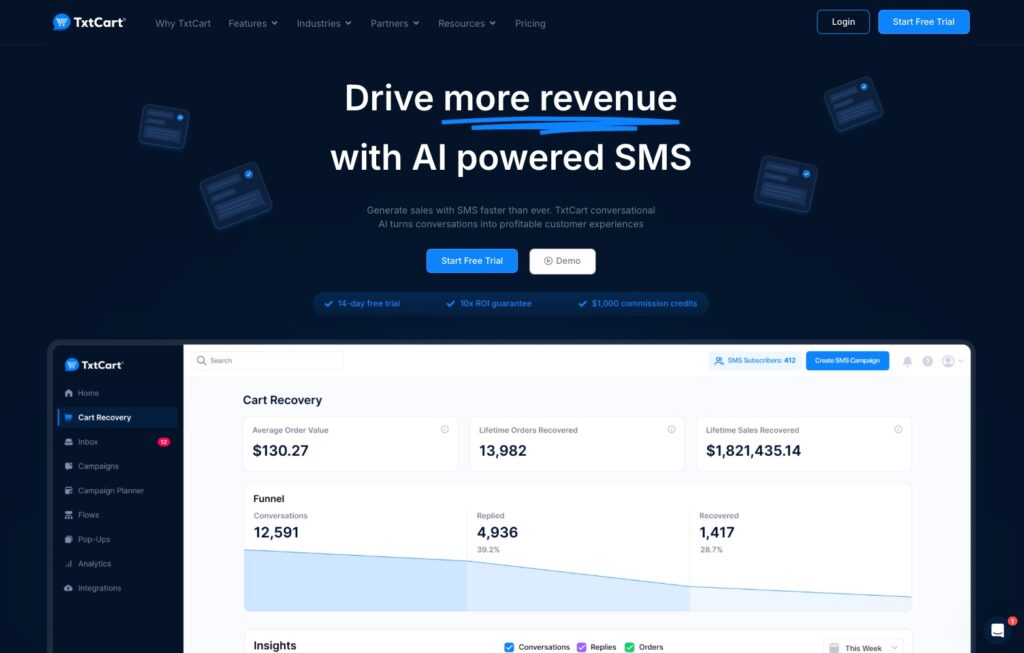
When it comes to TCPA compliance, TxtCart stands out as a comprehensive solution that helps Shopify and eCommerce brands maintain strict adherence to regulatory requirements across multiple regions. With features designed to automate compliance, manage consent, and ensure quiet-hour messaging, TxtCart simplifies the complexities of SMS marketing while staying firmly within legal boundaries.
1. TxtCart’s Compliance Capabilities
TxtCart was built with compliance at its core, ensuring that every SMS campaign aligns with TCPA and related regulations. Here’s how TxtCart’s compliance-driven automation streamlines key aspects of regulatory adherence:
- Automation for TCPA Compliance: TxtCart handles essential compliance tasks such as message scheduling, opt-out processing, and consent tracking automatically. This ensures that every message sent meets TCPA guidelines, reducing the risk of human error and non-compliance.
- Consent Management: TxtCart simplifies the process of obtaining and documenting express consent from customers. Each opt-in is tracked and stored, providing a secure record that can be referenced if a compliance question arises.
- Quiet-Hour Enforcement: With built-in quiet-hour settings, TxtCart prevents messages from being sent outside of 8 AM to 9 PM in the customer’s local time zone, a TCPA requirement. This feature ensures that all messages reach recipients at appropriate times, helping businesses avoid fines for after-hours messaging.
Why This Matters: By automating these critical aspects, TxtCart minimizes compliance risks while freeing up your team to focus on strategy and engagement.
2. Conversational AI and Compliance
TxtCart’s AI-powered SMS capabilities bring a unique, compliance-friendly approach to customer interactions. TxtCart’s Conversational AI enables two-way messaging that feels personal and responsive, but it also adheres to strict TCPA and other regulatory standards.
- AI-Driven, Compliant Responses: TxtCart’s Conversational AI generates real-time, legally compliant responses to customer queries. Whether it’s an inquiry about a product or follow-up questions on an order, TxtCart’s AI ensures that all responses align with TCPA requirements by staying within the boundaries of consent and avoiding unsolicited marketing.
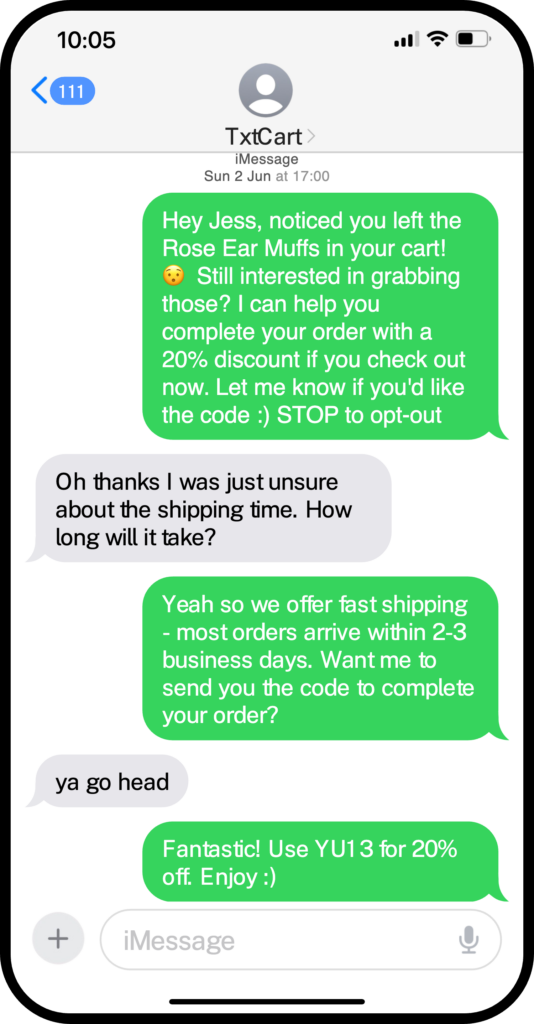
- Automated Opt-Out Management: TxtCart’s AI handles opt-out requests seamlessly, processing replies like “STOP” in real-time. This immediate response capability ensures that customers are instantly unsubscribed upon request, keeping your campaigns compliant with TCPA’s opt-out regulations.
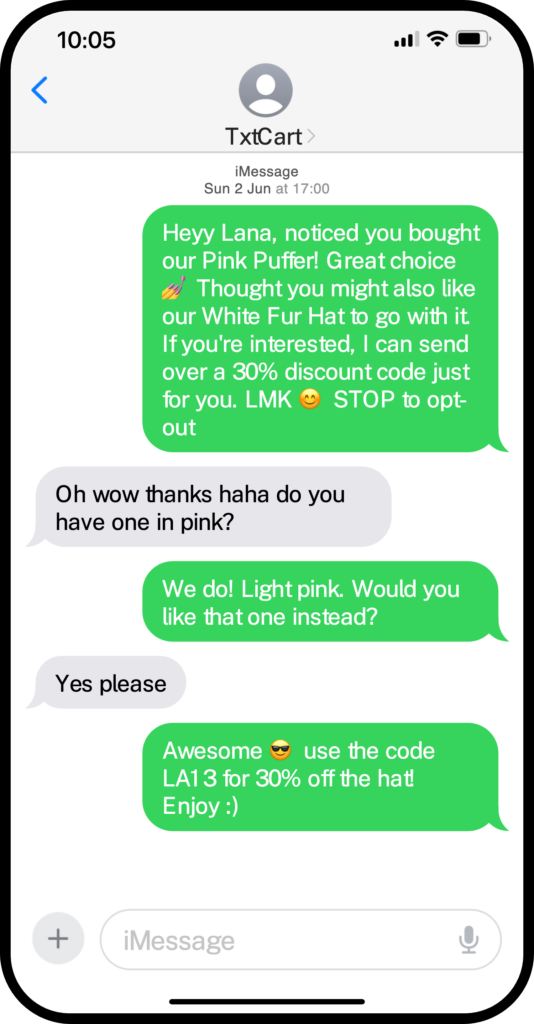
- Personalized, Trust-Building Interactions: TxtCart’s conversational AI goes beyond one-sided marketing; it fosters a dialogue that increases customer engagement while strictly observing compliance boundaries, enhancing trust and satisfaction.
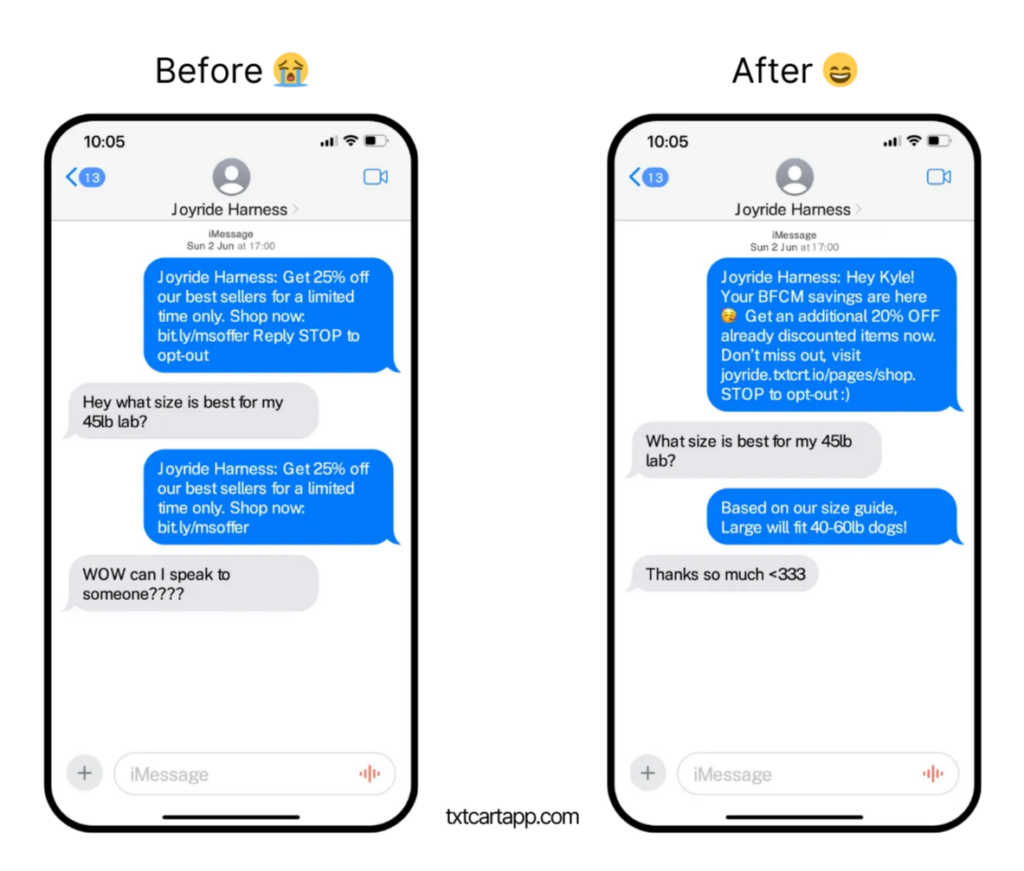
Quick Tip: TxtCart’s AI-driven compliance management means your team doesn’t have to monitor every interaction manually, allowing for scalable, compliant, and high-impact customer engagement.
3. Support for International Compliance (GDPR and CCPA)
While TCPA compliance is essential for US-based customers, global brands must also consider international regulations like GDPR (Europe) and CCPA (California). TxtCart is designed to support compliance with these additional standards, ensuring that your SMS campaigns respect international privacy laws.
- GDPR Compliance: For brands targeting European customers, GDPR compliance is essential. TxtCart helps businesses meet GDPR requirements by managing consent, securely storing customer data, and providing clear opt-out options. This way, customers have full control over their data and can request deletion or access as needed.
- CCPA Compliance: TxtCart’s support for CCPA helps brands cater to customers in California by providing transparent opt-in and opt-out options. It ensures that businesses respect customers’ data rights by allowing them to control, access, and delete their personal information as per CCPA guidelines.
- Flexible Data Management: TxtCart’s compliance tools provide flexible data management options, enabling brands to handle consent and data access requests across regions. This multi-region support means your brand can confidently expand its SMS marketing reach while staying compliant with privacy laws.
TxtCart’s multi-region compliance features make it easier for Shopify and eCommerce brands to build a global SMS marketing strategy that respects diverse privacy regulations and customer preferences.
TxtCart’s robust, compliance-focused design makes it an ideal SMS platform for brands navigating TCPA, GDPR, and CCPA regulations. With features like automated consent management, quiet-hour scheduling, Conversational AI, and multi-region compliance, TxtCart helps businesses maintain a compliant SMS marketing strategy that builds trust and fosters engagement. Whether you’re targeting US-based customers or expanding globally, TxtCart’s tools ensure that your campaigns stay within legal boundaries, allowing your brand to grow confidently and responsibly.
10. FAQs on TCPA Compliance for SMS Marketing
TCPA compliance can be complex, and it’s natural for eCommerce brands to have questions about staying within legal boundaries while engaging customers through SMS marketing. Here are some frequently asked questions to help clarify TCPA regulations and ensure your SMS campaigns remain compliant and effective.
1. What is TCPA, and Why Is It Important for SMS Marketing?
The Telephone Consumer Protection Act (TCPA) is a federal law established in 1991 to protect consumers from unsolicited marketing phone calls, faxes, and text messages. For eCommerce brands using SMS marketing, TCPA compliance is crucial because it:
- Prevents Unsolicited Messaging: TCPA regulations require businesses to obtain express consent before sending marketing texts, respecting consumers’ communication preferences.
- Reduces Legal and Financial Risks: Violating TCPA regulations can lead to steep penalties—ranging from $500 to $1,500 per violation—which can quickly add up, especially for high-volume SMS campaigns.
- Builds Customer Trust: Following TCPA guidelines demonstrates that your brand respects privacy and consumer rights, building a positive, trust-based relationship with your audience.
TCPA compliance isn’t just about avoiding fines; it’s about creating a respectful and effective SMS marketing strategy that prioritizes customer preferences.
2. How Do I Obtain Express Written Consent?
Obtaining express written consent is the foundation of TCPA compliance for SMS marketing. This, prior express written consent confirms that a customer has willingly agreed to receive marketing messages from your brand.
- What Qualifies as Express Written Consent?
- Checkboxes on Checkout Pages: Include a checkbox that customers must actively select to opt into SMS marketing.
- SMS Keyword Opt-Ins: Encourage customers to text a specific keyword to a designated number to confirm their consent.
- Sign-Up Forms: Forms on websites or social media channels where users explicitly agree to receive messages.
- Sample Consent Language:
Use clear, specific language that outlines what customers can expect. For instance:“By checking this box, you agree to receive promotional SMS messages from [Your Brand]. Message frequency may vary. Reply STOP to unsubscribe. Message and data rates may apply.”
Quick Tip: Make sure customers take a specific action to indicate consent, such as checking a box or replying to an SMS opt-in keyword.
3. Can I Be Fined for Texting at the Wrong Time?
Yes, TCPA regulations mandate that SMS messages can only be sent during designated hours—from 8 AM to 9 PM local time in the recipient’s time zone.
- Penalties for Violating Quiet Hours: Texting customers outside of these hours can lead to fines ranging from $500 to $1,500 per message. Even unintentional violations, such as sending messages at the wrong time due to time zone misalignment, can be costly.
- How to Avoid This Risk: Use an SMS platform with quiet-hour enforcement, like TxtCart, which schedules messages based on the recipient’s time zone, ensuring compliance automatically.
To take your SMS strategy further, check out How to Improve Your SMS Response Rate for Marketing for tips on boosting engagement while staying compliant.
Best Practice: Automate quiet hours through your SMS platform to reduce the risk of accidental violations and ensure that all messages are sent at compliant times.
4. Which Messages Are Exempt from TCPA Requirements?
While TCPA applies to marketing messages, certain transactional or informational messages are exempt from consent requirements. These messages are not intended for promotion and provide essential information related to a customer’s order or account.
- Examples of Exempt Messages:
- Order Confirmations: Notifications confirming the details of a customer’s purchase.
- Shipping Notifications: Updates on shipping status, delivery times, or delays.
- Security Alerts: Messages related to account security, such as login alerts or password reset links.
Important Note: If a message contains any promotional content (e.g., “10% off your next purchase”), it is no longer considered transactional and must adhere to TCPA guidelines, including obtaining consent.
Looking for inspiration? Our Best SMS Marketing Examples showcase compliant, high-converting campaigns that maintain customer trust and adhere to regulations.
Understanding TCPA requirements for SMS marketing can seem overwhelming, but compliance becomes manageable with the right practices and tools. By prioritizing customer consent, respecting quiet hours, and distinguishing between promotional and transactional messages, eCommerce brands can build a compliant, effective SMS strategy that enhances customer trust and minimizes legal risks.
For more detailed guidance, consider using a TCPA-compliant platform like TxtCart, which automates these aspects of compliance and simplifies the complexities of SMS marketing regulations.
TxtCart is built with TCPA Compliance in mind ✅
Staying TCPA-compliant isn’t just about avoiding fines—it’s about fostering trust with every text. When customers know that you prioritize their privacy, they’re more likely to engage with your messages, boosting both loyalty and conversion. TxtCart’s built-in compliance features, like automated consent tracking, quiet-hour scheduling, and international privacy tools, make it easy to align with legal standards without sacrificing customer experience.
Start Your Free 14-Day TxtCart Trial
TxtCart’s tiered plans offer flexible options for businesses of all sizes. With a 14-day free trial on every plan, you can explore TxtCart’s compliance features, from consent management to conversational AI, and see how it boosts both compliance and engagement.
- Starter Plan ($29/month): Essentials for growing brands, with 15% commission on recovered carts.
- Growth Plan ($79/month): Adds segmentation and list growth tools, with a 10% commission.
- Pro Plan ($199/month): Includes advanced analytics and a flow builder, reducing commission to 5%.
- Enterprise Plan ($499/month): Custom workflows, 24/7 support, and the lowest 2.5% commission for high-volume brands.
Start Your TxtCart Trial Now and explore how automated compliance can transform your SMS strategy.
Want to try conversational SMS for free?
Drive more sales with intelligent AI-driven automations that recover carts, engage customers, and streamline flows — saving you 32x in costs. No contracts or minimums.
- Try free for 14 days
- 10x ROI guaranteed
Get Personalized Support for Your SMS Strategy
Need tailored advice on SMS marketing compliance or optimizing your campaigns? TxtCart’s team of experts is here to help. Book a free strategy call and discover how TxtCart can align with your goals, enhance customer engagement, and deliver measurable results.
Book Your Strategy Call Now to secure a personalized marketing plan.
Recommended Next Steps:
- Audit Your Current SMS Practices: Review current SMS practices to ensure all messages align with TCPA standards.
- Explore TxtCart’s Compliance Tools: Leverage TxtCart’s features like quiet-hour scheduling and automated consent tracking to streamline your compliance efforts.
- Stay Informed on Regulations: Keep up-to-date with TCPA, GDPR, and CCPA changes to keep your SMS strategy compliant and secure.
Read Next:
